Electric Flux
Important Questions on Electric Flux
and are two hollow concentric spheres with charge and Space between and is filled with a dielectric of dielectric constant, . The ratio of flux through and flux through is Then find the value of
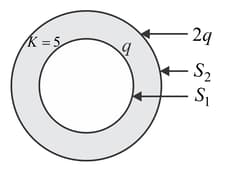
A point charge is located on the axis of disc of radius at a distance from the plane of the disk. If one fourth of the electric flux from the charge passes through the disk, then (as shown in figure). Suitable value for can be,
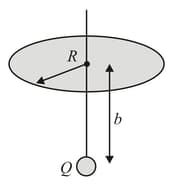
A right circular imaginary cone is shown in the figure. and are the points in the plane containing the base of the cone, while is the point at the vertex of the cone. If and represent the flux through the curved surface of the cone when a point charge is at points and respectively, then
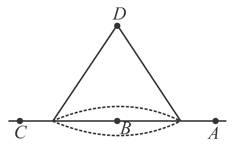
Two charges and lie inside and outside, respectively, of a closed surface . Let be the field at any point on and be the flux of over .
An infinite wire having charge density passes through one of the edges of a cube having edge length . Find the
(a) total flux passing through the cube,
(b) flux passing through the surfaces which are in contact with the wire,
(c) flux passing through the surfaces which are not in contact with the wire.
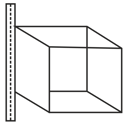
An infinitely long uniform line charge distribution of charge per unit length lies parallel to the -axis in the plane at (see figure). If the magnitude of the flux of the electric field through the rectangular surface lying in the plane with the centre at the origin is ( is permittivity of free space ), then the value of is ____.
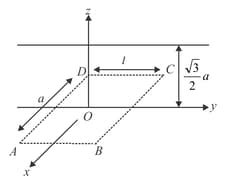
An infinitely long thin non-conducting wire is parallel to the -axis and carries a uniform line charge density . It pierces a thin non-conducting spherical shell of radius in such a way that the arc subtends an angle at the centre of the spherical shell, as shown in the figure. The permittivity of free space is . Which of the following statements (are) true?
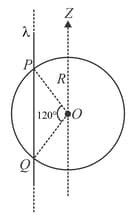
A point charge is placed just outside an imaginary hemispherical surface of radius as shown in the figure. Which of the following statements is/are correct?
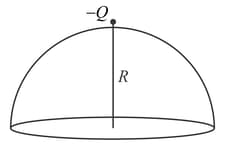
A cubical region of side a has its centre at the origin. It encloses three fixed point charges, at at at . Choose the correct option(s).
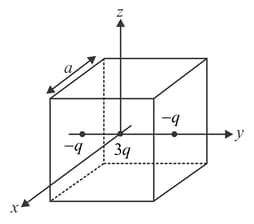
Consider electric field , where is a constant. The flux through the shaded area (as shown in the figure) due to this field is:
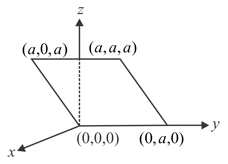
One-fourth of a sphere of radius is removed as shown in the figure. An electric field exists parallel to the plane. Find the flux through the remaining curved part.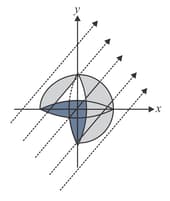
The number of electric field lines crossing an area is when , while the number of field lines crossing the same area is when makes an angle of with . Then
A conic surface is placed in a uniform electric field as shown in the figure such that the field is perpendicular to the surface on the side . The base of the cone is of the radius , and the height of the cone is . The angle of the cone is . Find the magnitude of the flux that enters the cone’s curved surface from the left side. Do not count the outgoing flux .
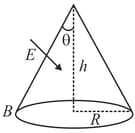
A flat, square surface with sides of length is described by the equations , , . The electric flux through the square due to a positive point charge located at the origin is
In a region of space, the electric field is given by . The electric flux through the surface of the area in the plane is
A cylinder of the length and the radius has its axis coincident with the axis. The electric field in this region is . Find the flux through the left end of the cylinder.
